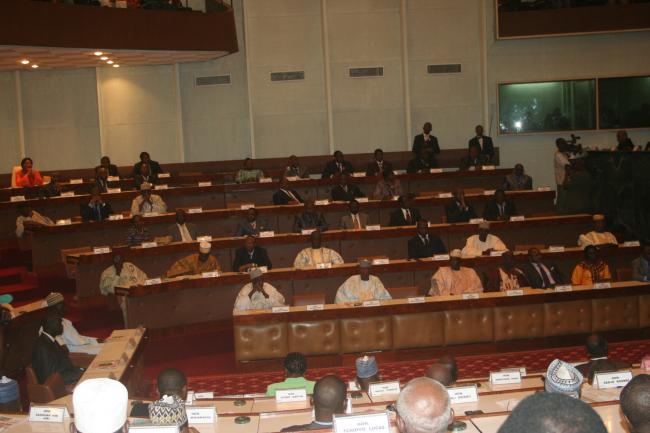Cameroon’s budget in revenue and expenditure stands at CFA 2800 billion. It was adopted Tuesday November 29 after a month long deliberations.
The budget has witnessed a jump from that of last year. The increase in absolute terms totals CFA 229 billion. Increase which Mps say is proof that the economy is making strides also attests Cameroonians’ determination to accompany Head of state Paul Biya in his major accomplishments vision. Over CFA 761 billion has been set aside for investments. In the build up to Tuesday’s adoption, a string of other bills were approved. Cameroonian workers of the public, para-public and private sectors would henceforth receive more humane treatment from their employers. This follows two bills adopted by parliament Monday November 28, 2011.
The first (law n°989/PJ/An) authorizes the President of the Republic to ratify the 144th convention on international labour norms. All states that ratify this convention agree to put in place effective procedures between government, employers and workers. The aforementioned procedures are to be determined by each state, depending on the internal laws of the country. According to this convention, employers and employees would equally be represented at all levels. The convention would be applicable in Cameroon 12 months after ratification. Ratifying states can withdraw their membership 10 years after the convention’s initial date of application.The second bill (law n°899/PJ/AN) allows the Head of state to ratify convention n°155 on the security and health of workers. Adopted on June 22, 1981 in Geneva Switzerland, this convention is applicable to all workers and in all economic activities. Every country which ratifies this convention is expected to liaise with associations of employers and workers. This is to enable them “define and put in place as well as periodically re-examine a coherent national policy in a hid to prevent industrial accidents, health and all risks that are linked to word”, the explanatory note of the minister of Labour and social security says. The said national policy would clearly spell out the responsibility of government, employers, workers and other stakeholders concerned. At the level of enterprises, employers must ensure that the work sites, equipment, chemicals and other substances used do not represent a threat to the health and security of others. Employers would have to provide particular clothes and equipment for the protection of their workers.
The ratification of this convention further permits enterprises to handle crises and other sudden occurrences. The rapporteur of the commission insisted that “the adoption of these bills represents a plus to the state of Cameroon”. Yet, his proposal did not hold-up to the scrutiny of Mps. Hon Adolph Ngalle Namme questioned the minister of labour and social security on the fate of workers of the sector. “Over 100 of these workers we laid off a couple of years back, for 3 months they have invaded the premises of the regional delegations of labour and social security, employment and vocational training and that of sports and physical education”, he explained. After him, Hon Gadama mounted the rostrum to quiz minister Robert Nkili on the future of private sector workers who regularly contributed at the social insurance fund but do not receive retirement benefits. “Some have died in this situation and many more will keep on dying in the same situation”, he regretted. Answering these questions, Mr Nkili said “after the privatization of the tea sector, the new owner of the plantation had to change the old habits and management techniques. During a 2007 crisis meeting in Buea after the demonstration of disgruntled workers, I urged the proprietor to do all it takes to appease his workers”, he further said. The ad hoc committee put in place to settle the issue realized that over Cfa 2 milliards had to be paid to the workers. Nkili said “we were unable to resolve this matter and it was sent to the judiciary.” Examined by the courts of appeal and first instance in Buea without success, “the matter today lies in the supreme court and, by the principle of separation of power, government cannot press on this court to quickly handle the issue”, the minister expatiated. He advised the workers who had hijacked the three regional delegations not to impede the functioning of government services.Concerning Hon Gadama’s question on the National social insurance fund, Nkili said, “workers generally contribute but their bosses fail to hand in these contributions to the social insurance fund”. To this effect, he urged the insurance fund to effectively collect contribution from workers of all private companies in a bid to avoid such deplorable situations in the future. Questions put to the minister by other members of parliament centered on his ministry’s role in improving the condition of workers across Cameroon.
MANYANYE IKOME



